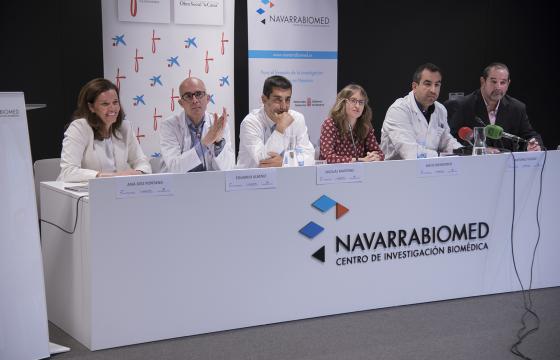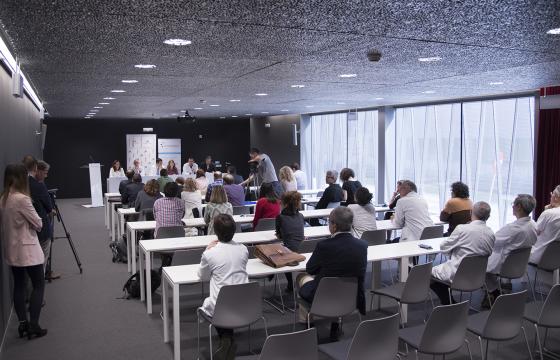Neuroepigenetics
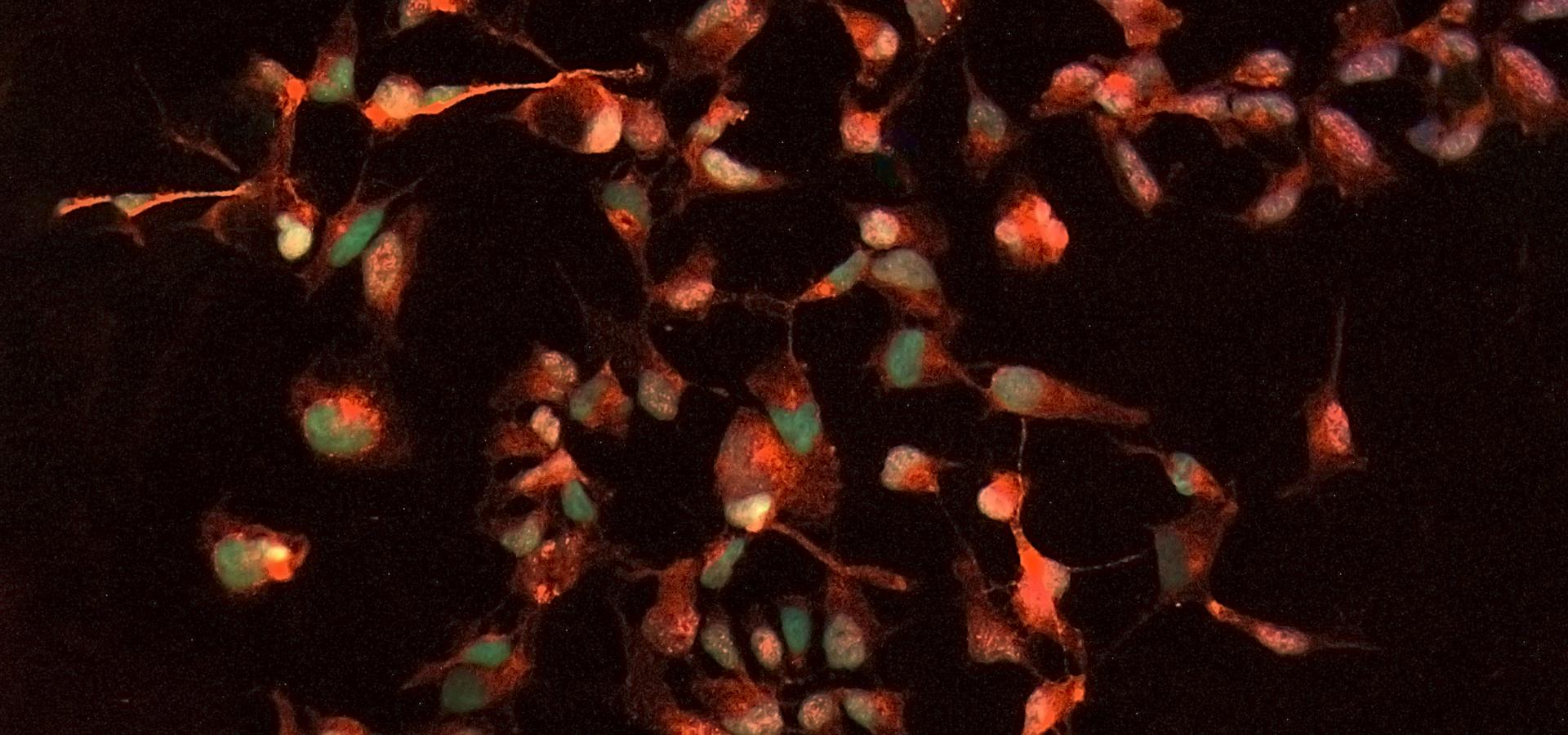
This Research Unit’s goal is to describe the DNA methylation pattern and how it affects the development of neurological diseases, especially degenerative dementias like Alzheimer’s disease. The ultimate goal is to find epigenetic biomarkers that could be used for diagnosis, prognosis and treatment. Research in this field covers other neurological disorders such as epilepsy or multiple sclerosis. The Unit is particularly interested in epigenetic modifications in certain rare monogenic disorders associated with neurological disorders like laminopathies.
The team work in cooperation with other teams from the Navarra Hospital Complex. They study stroke biomarkers along with the Vascular Brain Disease Group, the Neuromuscular Disease and Motor Brain Cell Group and the Multiple Sclerosis Group. Additionally, they aim at describing how environmental factors or targeted activities affect methylation patterns in healthy individuals.
Lines of research:
- Identification of epigenetic biomarkers in Alzheimer’s and other neurodegenerative diseases.
- Neurogenesis mechanisms in Alzheimer’s disease: new therapeutic targets.
- Epigenetic regulation in laminopathies and other rare diseases.
- Meditation-induced epigenetic modifications.
Iván Méndez-López will present his doctoral thesis on Monday, December 19

Iván Méndez-López, clinician and predoctoral researcher at the Neuroepigenetics Unit from Navarrabiomed - IdiSNA will present his doctoral thesis by the Public University of Navarra next Monday, December 19, at 12:00 in the assembly hall of Navarrabiomed.
The doctoral work, which is entitled "Blood pressure targets for hypertension in people with chronic renal disease", has been developed in the Internal Medicine Service of the University Hospital of Navarra and Navarrabiomed, under the direction of Doctors Juan Erviti López and Luis Carlos Saiz Fernández, researchers of the Innovation and Organization Unit of the Navarra Health Service-Osasunbidea.
Research development
So far there is no established evidence about the optimal blood pressure figures in people with arterial hypertension (AHT) and chronic kidney disease. Using the proven methodology of the Cochrane organization, Méndez-López's work has carried out the first systematic review that addresses this issue with individualized patient data. After the inclusion of 7,348 patients from six clinical trials, it is concluded that an intensive reduction in blood pressure does not provide greater health benefits than those obtained with a standard reduction in blood pressure (BP) in patients with AHT and chronic kidney disease. The relevance of these conclusions suggests that the current recommendations of BP targets for this population should be amended by the international clinical practice guidelines.
Dissemination of results
The work carried out has led to a scientific publication in 2019, in the Cochrane Database of Systematic Reviews (CDSR), the main journal and database of systematic reviews in health care: “Blood pressure targets for hypertension in people with chronic renal disease”. In addition, partial results of the study have been disseminated at the thirty-first European Meeting on Hypertension and Cardiovascular Protection, held in June 2022 in Athens, Greece.
Amaya Urdánoz will present her doctoral thesis on Tuesday, July 5th
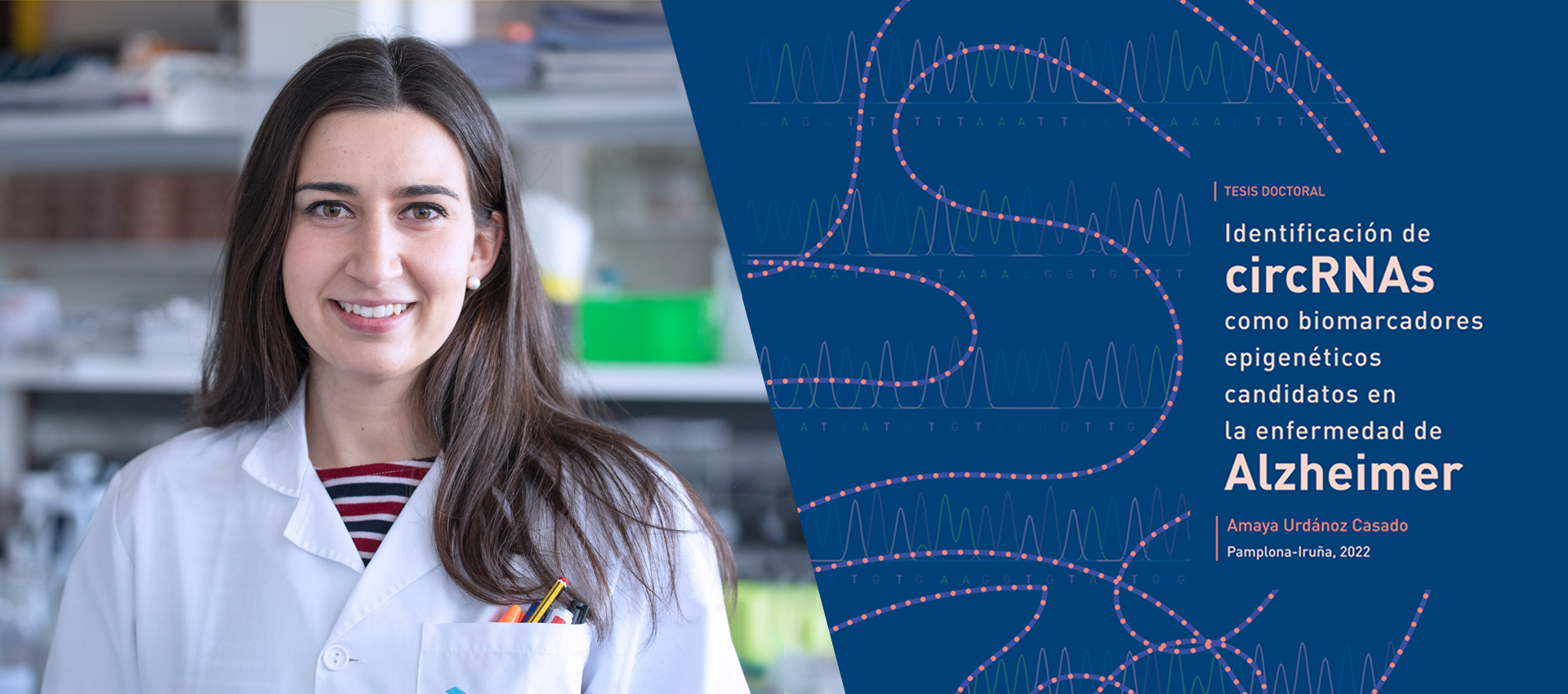
The predoctoral researcher of the Neuroepigenetics Unit of Navarrabiomed, Amaya Urdánoz Casado, will be sitting her viva from the Public University of Navarra next Tuesday, July 5th at 11:00 in the Assembly Hall of Navarrabiomed.
The doctoral work, entitled "Identification of circRNAs as candidate epigenetic biomarkers in Alzheimer's disease”, has been developed at Navarrabiomed under the direction of Maite Mendioroz Iriarte and Idoia Blanco Luquin.
This research focuses on Alzheimer's disease (AD), a neurodegenerative, chronic and, at the moment, irreversible disease that represents the first cause of age-related dementia. It is postulated that circular RNAs (circRNAs) play important roles in brain homeostasis, as well as in the development of neurodegenerative diseases.
The objective of this doctoral thesis is to identify, in patients with AD compared to controls, circRNAs with differential expression in the human entorhinal cortex (CE), a brain region especially vulnerable to AD. To do this, the study of the expression of circRNAs is proposed using a candidate gene and a genome-wide approach.
In the former, candidate gene approach, 10 genes were selected, whose role in AD had already been described in the literature and from which circRNAs originated. 6 circRNAs derived from the APP, ADAM10, CDR1 and HOMER1 genes were identified, of which 4 showed a differential expression in EC between patients with AD and controls. In addition, three potential circRNAs derived from the TREM2 gene were identified for the first time in the EC.
In the second genome-wide approach, new circRNAs differentially expressed in the EC were identified that so far had not been associated with the development of the disease by transcriptome sequencing in patients with AD with respect to controls. In addition, several circRNA-miRNA-mRNA interaction networks (competitive endogenous RNA network, ceRNET) were predicted.
The results obtained show the deregulation of a series of circRNAs in the EC affected by AD with respect to controls, suggesting their potential involvement in the pathogenesis of the disease.
Disclosure of results and financing
The work carried out has resulted in a scientific publication in the International Journal of Molecular Sciences, “Gender-Dependent Deregulation of Linear and Circular RNA Variants of HOMER1 in the Entorhinal Cortex of Alzheimer's Disease”.
In addition, it has been disseminated at several national and international congresses, the Alzheimer's Association International virtual Conference Satellite Symposium, the 15th International virtual Conference on Alzheimer's and Parkinson's Diseases: Mechanisms, Clinical Strategies and promising Treatments of Neurodegenerative Diseases or at the BraYn Conference: Second brainstorming research assembly for young neuroscientists.
For the development of the thesis, Amaya Urdánoz has received several grants for the recruitment of doctoral students by companies and research and knowledge dissemination organizations: industrial doctoral students 2018-2020 and grants for the financing of a predoctoral contract in health sciences and technologies in the period 2019-2022, both funded by the Government of Navarra. She also received an Erasmus scholarship for her stay at Karolinska Intitutet and an aid for the mobility of doctoral students - UPNA Congresses (2021) to attend, with a communication of her research, the 15th International virtual Conference on Alzheimer's and Parkinson's Diseases: Mechanisms, Clinical Strategies and promising Treatments of Neurodegenerative Disease.
‘la Caixa’ Foundation, Caja Navarra Foundation and Navarrabiomed launch programme to foster public biomedical research in Navarra
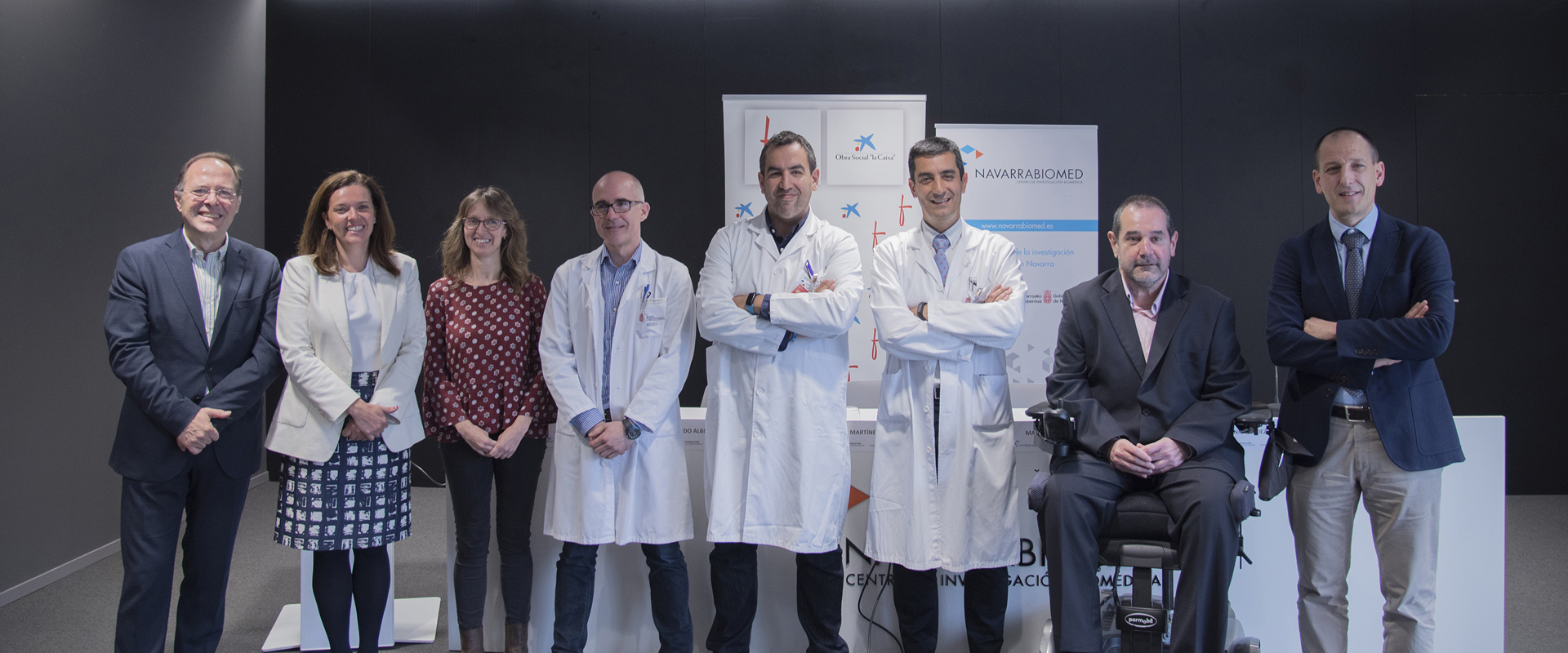
- The programme will offer support to the development of studies in digestive medicine, geriatrics, neuroscience and oncology that will bring advancement and excellence in these fields of research.
- ‘la Caixa’ Foundation and Caja Navarra Foundation are channelling 1.2 million Euro into this programme, to be run by the biomedical research centre Navarrabiomed, where four doctors from the Navarra Health System-Osasunbidea (SNS-O) will carry out quality biomedical research studies.
- Through this programme, ‘la Caixa’ Foundation and Caja Navarra Foundation will give support to the leading research centres in Navarra during the 2017-2021 period. Universities and research centres will thus get a total 6.4 million Euro.
Ana Díez Fontana, Regional Director of CaixaBank in Navarra; Javier Miranda, Chairman of Caja Navarra Foundation; and Iñigo Lasa, Director of Navarrabiomed, announced the research lines to be developed by doctors Eduardo Albéniz Arbizu, Nicolás Martínez Velilla, Maite Mendióroz Iriarte and Antonio Viudez Berral, who were selected by an external evaluation committee from 12 candidates.
The specialists in the programme will be relieved from part of their medical activity so that they can do research. They need time to develop their scientific projects and produce new knowledge in their medical specialties. The initiative enables the establishment of a critical mass of professionals that combine medical activity with research jobs, thus promoting translational medicine to the benefit of patients and society as a whole.
The four doctors selected to join the programme will soon start working at the labs of Navarrabiomed – the joint biomedical research centre of the Government of Navarra and the Public University of Navarra (UPNA). They will establish separate research units for the development of their projects, based on clinical practice at the Navarra Hospital Complex (CHN), with support from other Navarrabiomed units and platforms.
In addition to streamlining research activities in the respective units, they will encourage the participation of resident medical interns (MIRs) by getting them involved in biomedical research projects, trials and programmes.
Four excellent research projects in digestive medicine, geriatrics, neuroscience and oncology
Eduardo Albéniz Arbizu has worked in a number of hospitals across Spain. He received training in advanced endoscopy in France, Japan and China. Currently, he is working at the Gastrointestinal Endoscopy Unit of the CHN Digestive Medicine Service.
Dr Albéniz specialises in endoscopic mucosal resection (EMR) and endoscopic submucosal dissection (ESD) for the removal of early-stage gastrointestinal tumours. These advanced procedures reduce the number of surgical and other more invasive interventions in the treatment of superficial neoplastic lesions. Resection of colorectal polyps, for example, is the procedure with the highest survival rates observed in screening studies for colorectal cancer carried out in Navarra.
The goal of the project led by Dr Albéniz is to provide evidence for the identification of predicting factors for the effectiveness of resection procedures and other factors associated with potential complications that might be minimised.
Nicolás Martínez Velilla has been the Head of the Geriatrics Unit at CHN since 2015. In 2013, he was appointed head of a team partnered with Navarrabiomed for the promotion of research into different aspects of geriatric medicine.
Dr Martínez Velilla’s proposal includes a thorough study for the prevention of old-age frailty and disability or dependency in hospitals and in the community at large. Furthermore, it includes the creation of a European cross-border network to deal with various aspects of ageing. The project is aimed at rethinking hospitalisation of older adults, prescribing exercise to older patients in hospitals so as to improve their quality of life and increasing the sustainability of the health system.
Maite Mendióroz Iriarte has built her professional career as a doctor and researcher in Pamplona, Barcelona, San Sebastián and New York. Since 2010, she has been a member of the Neurology Department at CHN. Over the past few years, she has received grants from ‘la Caixa’ Foundation, Caja Navarra Foundation and the Government of Navarra to boost activity in the Neuroepigenetics Unit at Navarrabiomed.
Between 2018 and 2021, Mendióroz Iriarte will develop a project whose goal is to identify a potential blood-based epigenetic biomarker for early detection and treatment of Alzheimer’s disease. Her study might become the first step towards the implementation of precision medicine in neurodegenerative diseases.
Antonio Viudez Berral has developed his professional career in Navarra, Catalonia and Baltimore, USA. In 2010, he joined the Medical Oncology Service at CHN. Since then, he has been a researcher at Navarrabiomed as well.
Dr Viudez’s project will study pancreatic neuroendocrine tumours to find accurate markers that predict the effectiveness of certain therapies.
In addition, the Medical Oncology Service will be able to strengthen its scientific activity, establishing new lines of research for the improvement of diagnosis, prognosis and prediction of treatment response and toxicity.
From left to right: Luis Gabilondo, Ana Díez, Maite Mendióroz, Eduardo Albéniz, Antonio Viudez, Nicolás Martínez, Javier Miranda and Iñigo Lasa.
CHN and Navarrabiomed publish innovative study on liquid biopsy for amyotrophic lateral sclerosis diagnosis and follow-up
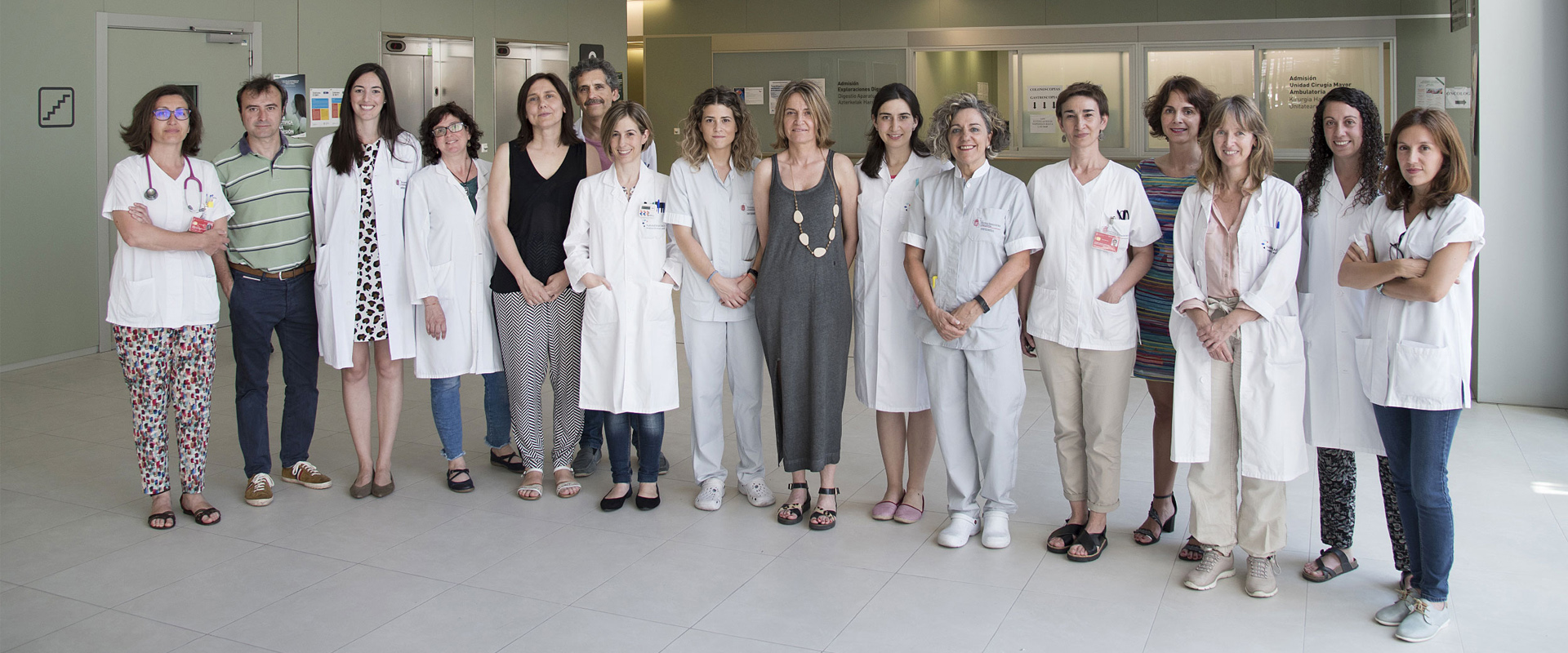
The Navarra Hospital Complex (CHN) and the biomedical research centre Navarrabiomed have carried out an innovative study of the so-called ‘liquid biopsy’ in amyotrophic lateral sclerosis (ALS) diagnosis and follow-up. The results of this study were published in the international peer-reviewed journal Annals of Translational Medicine.
On the occasion of the Global ALS Awareness Day, members of the multidisciplinary team treating patients with ALS in Navarra shared the latest research and care developments in connection with this disease, including this innovative study of the use of liquid biopsy testing in ALS diagnosis and follow-up.
The leaders of the study were Maite Mendióroz and Ivonne Jericó, doctors from the CHN Neurology Department and researchers at Navarrabiomed. The project was part of the scientific activity done at the Navarra Medical Research Institute (IdiSNA), a public-private agency for the promotion of biomedical research in Navarra. The survey involved ALS patients and a control group (individuals without ALS), and professionals from the departments of Neurology and Anaesthesiology and the Nursing Team at CHN, and the Neuroepigenetics Unit at Navarrabiomed.
According to the study coordinators, one of the biggest weaknesses in research into neurodegenerative disease is the difficulty to access and study the nervous tissue of living patients. In order to address this difficulty, the study analyses the application of liquid biopsy testing, a technique recently developed in the field of cancer research, to ALS diagnosis.
Liquid biopsy is based on the fact that, when cells degenerate and die, their contents – including DNA – flow into the bloodstream. The released DNA molecules contain biochemical information about the original cells (hence the name ‘biopsy’) – in this case, diseased neurons. The original cell contents can be isolated and analysed in blood samples (hence the name ‘liquid’). The researchers have successfully used this technique with ALS patients to identify a new gene, RHBDF2, as a biomarker for ALS diagnosis in the future.
‘To the best of our knowledge, this is the first time ever liquid biopsy has been used to diagnose neurodegenerative diseases. The results have been encouraging so far. Now we are planning to extend the technique to other neurodegenerative diseases, such as Alzheimer’s disease,’ the doctors said, adding that the survey was made possible by the generous participation of patients and their families, and the volunteers in the control group.
A multidisciplinary team, 11 years and more than 200 patients
The team treating ALS patients in Navarra have striven to promote ALS research right from the start. Currently, two researchers at the Navarrabiomed Neuromuscular Disease and Motor Neuron Disease Group (headed by Dr Jericó) are working on ALS for their PhD projects, and other four projects address this neurodegenerative disease – specifically, the identification of biomarkers for diagnosis and follow-up, the role of neuroinflammation, the underlying mechanisms, the analysis of genetic factors, and the study of epidemiological aspects and disability.
The Group coordinates both research and care activities, and collaborates with the Navarrabiomed Proteomics and Biobank platforms, the Neuroepigenetics Research Unit (headed by Dr Mendióroz) and the Navarra Public and Occupational Health Service (Rare Disease Registry).
Amyotrophic lateral sclerosis is a progressive nervous system disease with a heterogeneous clinical presentation but common symptoms like muscle weakness and progressive muscular atrophy. Prognosis is variable among patients. About 5 to 10 per cent of ALS is familial, which means it arises in families in which there is a history of ALS. The other 90 to 95 per cent of ALS is sporadic, meaning it occurs without a family history, its causes still being unknown. Every year, 1 to 2 people every 100,000 are diagnosed with ALS. Despite being a rare disease, it has a deep social and family impact. Currently, there is no cure for ALS, but this does not mean there is no treatment.
ALS care involves multiple disciplines. On the occasion of the Global ALS Awareness Day the multidisciplinary team at CHN shared an informative brochure with patients and their families, highlighting the importance of coordinated social and health care through multidisciplinary units or teams. Active for 11 years now, the CHN team have treated over 200 patients to date.
Navarra has been one of the first Spanish regions to implement a multidisciplinary care model for ALS patients. Since 2007, the region has been offering comprehensive, coordinated care to them and their families, through a multi- and interdisciplinary team whose members include a neurologist, (Dr Ivonne Jericó), a nutritionist (Dr Ana Zugasti), two pulmonologists (Dr Joan Boldú and Dr Begoña Fernandez), a neurophysiologist (Dr Asun Ibiricu), an intensive care physician (Dr Juan Pedro Tirapu), a social worker (Rakel Suescun), neurology nurses, dieticians, a palliative care service and members of the Psychological and Social Support Service at San Juan de Dios Hospital (Yolanda Santesteban and Ana Baños).
From the beginning, the team set out to offer adequate, tailored, patient-centred social and health care, while promoting research as the key to finding an effective treatment for ALS.
Image: Members of the multidisciplinary team treating patients with ALS in Navarra.
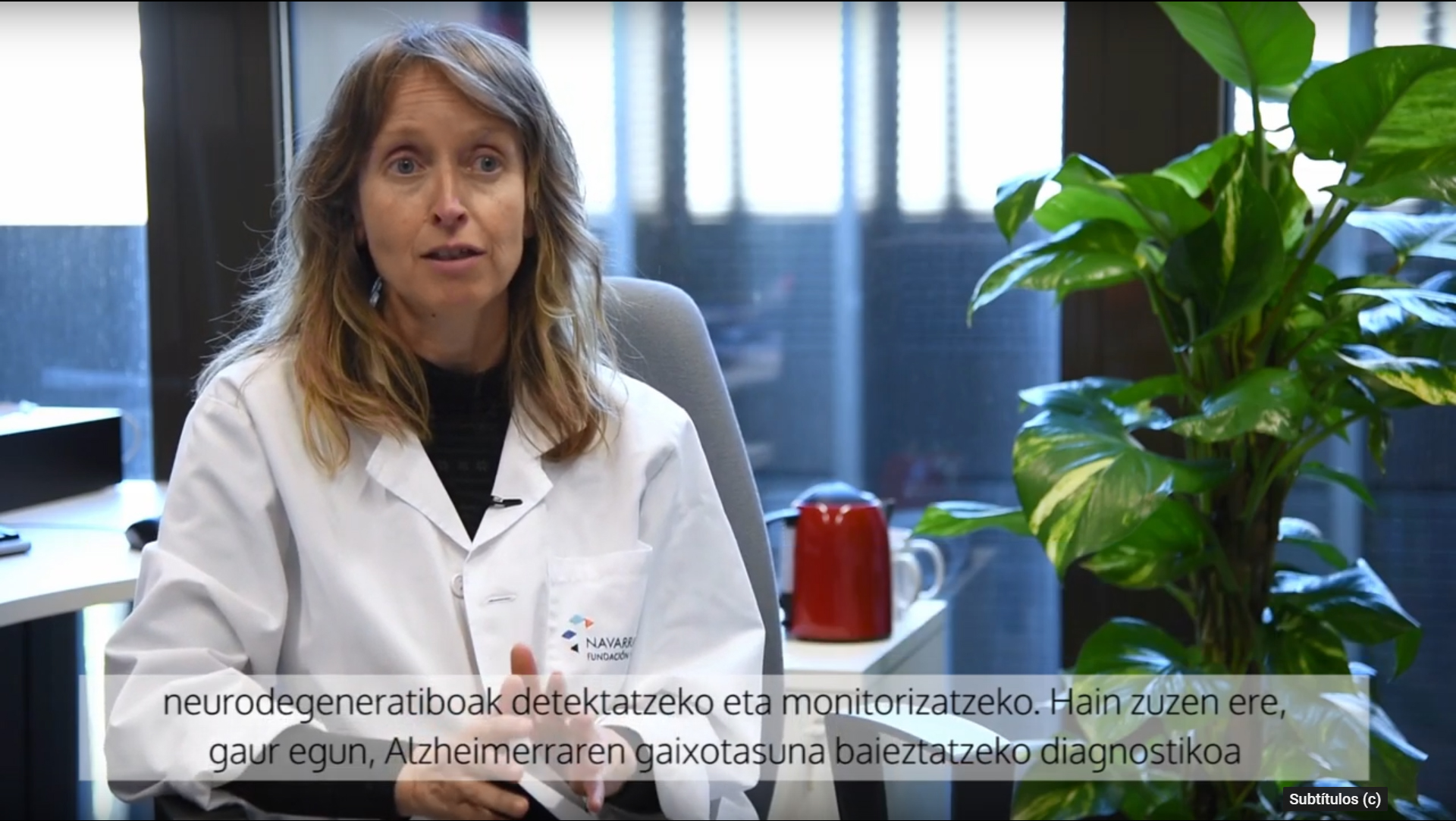

Navarrabiomed - Centro de investigación biomédica
Complejo Hospitalario de Navarra, edificio de investigación.
Calle Irunlarrea, 3. 31008 Pamplona, Navarra, España.



